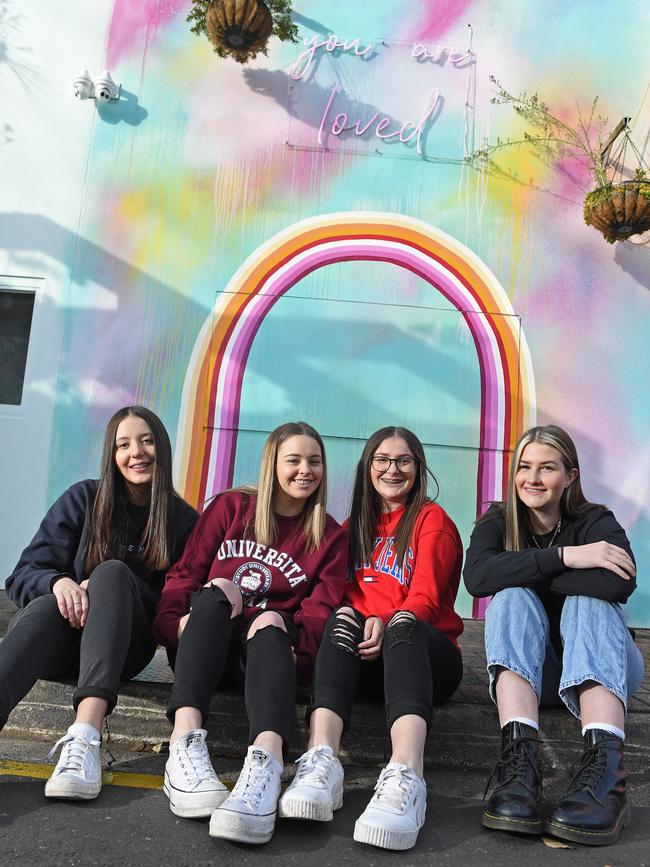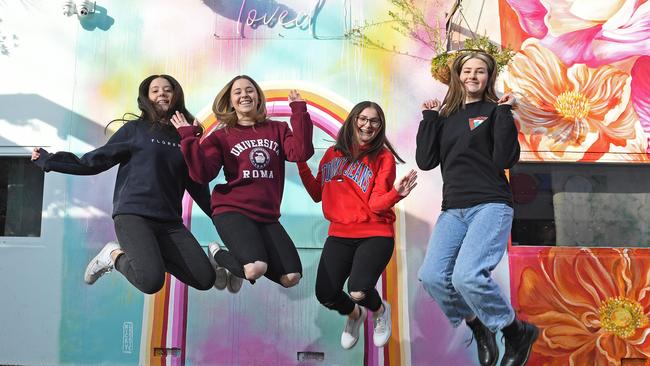Our COVID school leavers are ‘an amazing generation’ we can all be proud of, leaders say
This year’s school-leavers are being celebrated as a resilient, determined and insightful cohort of students who are intelligent, articulate, committed to social justice – and kind above all else.

Education
Don't miss out on the headlines from Education. Followed categories will be added to My News.
- Positives and negatives of Gen Alpha revealed by parents, teachers
- The things that matter most for parents in 2020
THE final year of school is always memorable but for the 2020 cohort, it will go down as one in which its students shone in the face of unprecedented challenge and uncertainty.
St Mary’s College Year 12 student Caoilinn Murphy says she and her classmates are determined to make the most of the unusual situation.
“I think we have definitely become more supportive of each other and we will come out of it stronger, in terms of school and grades and things like that – not just at my school but the Year 12 cohort more generally,” she says.
“I think there is a big sense that we actually are doing it and we do have a great sense of pride because of the way we are getting on with life.
“Corona has made it harder but we have been able to adapt and overcome the challenges … I do feel like we are ‘in this together’ as Year 12s.”
Catholic Education SA deputy director John Mula says he is incredibly proud of young people in 2020.
“Young people today have a strong sense of social justice, perhaps much stronger than generations before them, despite living in a culture that values the individual,” he said.
“Through their words and their actions, they understand the importance of the common good and community.
“We often don’t recognise how resilient our young people are … they showed (through COVID) they are able to adapt to change and manage uncertainty far better than we give them credit for.”
South Australia’s Commissioner for Children and Young People, Helen Connolly, agrees.
“I think they are an amazing generation — they are articulate, insightful, intelligent and worldly with a pragmatic optimism,” she said.


“They are different to millennials … they are very much more about the social good, they are driven by values, they are incredibly accepting of diversity, they are kind, they talk about kindness — almost every conversation uses the word kind.”
For 17-year-old Caoilinn, life under lockdown has made her appreciate face-to-face connection.
“It’s not something I had ever thought about before but it made me realise you get a lot more out of face-to-face contact than social media,” she said, adding she is grateful her school got to have its formal before restrictions came in.
Caoilinn, who hopes to study law, says COVID-19 has changed her gap-year plans.
“I did have plans to go and travel when I first finished school but now I think I will just go straight into uni and hopefully get to travel during the breaks in second or third years,” she said.
Under the spotlight: ‘Generation COVID’

IT’S been almost six months since the first case of COVID-19, or novel coronavirus as it was being referred to back then, was confirmed in Australia.
Beyond the heartbreaking tragedy of death and illness, for many the financial implications have been dire.
But more than 24 weeks on, increasingly focus is turning to how the not-so-great global pandemic of 2020 will shape the lives of young Australians who are being coined by some “the COVID Generation”.
They are the leaders, influencers, educators, entrepreneurs, healthcare professionals, tradies, carers, retailers, hospitality, workers and parents of tomorrow.
There are no shortage of sobering reports which paint a bleak picture in the immediate aftermath with separation and divorce set to spike and projections of a tsunami of mental health issues and worrying rise in suicide.
Arguably most shocking are the results from the most recent Swinburne University monthly survey assessing the mental health of Australians in the face of COVID-19.
The percentage of participants aged between 18 and 25 who agreed they would be “better off dead” increased by 71 per cent between May and June.
Lead researcher Susan Rossell, a specialist in the area of neuropsychology, said the results left her veteran team members raw with emotion.
“I remember the statistician – who has worked on some very large suicide projects before – calling me in tears when she actually processed all the data, telling me, ‘I have never seen anything like this’,” Professor Rossell said.
”For me, the most interesting thing about the data was anxiety and stress was also very high for those over 25 but it wasn’t leading to that kind of catastrophic reaction in the older people.”
The five-year Swinburne project was launched in April to map the predicted uplift in anxiety and stress in wake of the crisis.
But what is the fix?
“That is the million dollar question,” Prof Rossell said.
“I guess we need to have some really serious conversations in terms of public policy, in terms of educating people about how to deal with stress and anxiety while everything is in such flux.”

Uncertainty emerges as a constant theme in conversations around life post COVID.
Bryan Atherton, from Adelaide-based Uniting Communities’ therapeutic youth services, said teenagers were questioning what life post COVID would look like.
“Young people are developing their own identities, finding their own voice for their adult life so to speak, so it is an uncertain time for them already, let alone without this added layer,” he said.
“It now becomes a question of, ‘I don’t even know what the world is going to look like in the future, let alone what my place in it is going to look like.’”
South Australia’s Commissioner for Children and Young People, Helen Connolly, discovered a similar sentiment in her investigations for a sweeping report, Reflections on COVID-19, based on interviews and conversations with 300 of the state’s children and young people.
“The big thing as humans is we live quite routine lives, we know what to expect, and we have these tried and true rites of passage that are built into the way we measure life,” Ms Connolly said.
“For many young people, the way they measure their personal success is by reaching milestones they have set themselves along the way, such as attending their graduation ceremony or pursuing travel plans during a gap year.

“Given many of these milestones have either been removed, delayed, reduced or worse cancelled, some young people are struggling to mark out new pathways that will bring them the same sense of achievement these would have provided
“When you lose that sort of anchoring in your life, you start to think about all those other things that could happen: ‘what happens if things never go back to normal, what happens if I can’t ever get a job, what happens if this course I am doing is pointless now, what happens if I can’t get into uni?’
“When that ‘what if’ kind of thinking is happening en masse, it can be quite destabilising and create a level of anxiety in people.”
Ms Connolly said it was crucial to have “direct and genuine conversations” with children and young people about those things they say matter most to them.
“These are our future leaders and this ‘Covid Generation’ has been impacted by this experience and we need to understand that,” she said.
“Young people repeatedly tell me that what they want is for governments to implement legislation, plans and strategies that promote four key values: inclusion, diversity, kindness and trust.
“Along with concerns about study and career opportunities, addressing climate change is one of the top three issues young people continuously identify as essential to their future.”
The disruption of routines surrounding school and extra-curricular activities such as sport and volunteer roles was felt intensely by many young people during lockdown, she found.
“I heard about how important participation in the community was and that the loss of that was a real struggle for them to be motivated,” she said.
“The flip side is, the amount of value they get out of being part of the community, whether that be attending cultural events, or sporting, or doing volunteering says a lot about who they are and what is important to them.”
There were other positive learnings, too.
“One of the key messages received was that online and digital connection is ‘just not the same’ as connecting with people in person,” Ms Connolly said.
“In the education space, they don’t want to lose some of the benefits around flexible learning – lots of kids talked about the positives of a more self-directed rather than teacher-led style of learning.
“For kids with disabilities, too, they said for them participation was on an even footing for the first time.
“Others described the slowing down of society as providing a much needed ‘pause’ that enabled them to reflect on the things that mattered most to them, including the people that bring them happiness.”
Social connection also topped the list of what people missed most in the Australian Institute of Family Studies’ Life during COVID survey of 7300.
“Friends, family and going out for dinner were among the most common things participants reported missing during isolation – it has been a really tough time for our younger generations, too,” AIFS director Anne Hollonds said.


“It is easy to assume that because they are on social media all the time they are getting their needs met but this has really highlighted that is not enough.
“We are humans, after all, and wired for face-to-face connection and it isn’t enough to just connect via social media.”
Mrs Hollonds said it was easy for parents to “underestimate their importance” in the lives of their teenagers.
”Anything we can be doing to stay connected, to listen to them is extremely important, to understand what there issues are an how they are experiencing things,” she said.
“We might be under stress ourselves as adults in the family but kids are also under stress and we should be really careful to listen to what they are going through and to offer support at this time.
“Family is extremely important – even if kids don’t always let us know it.”
